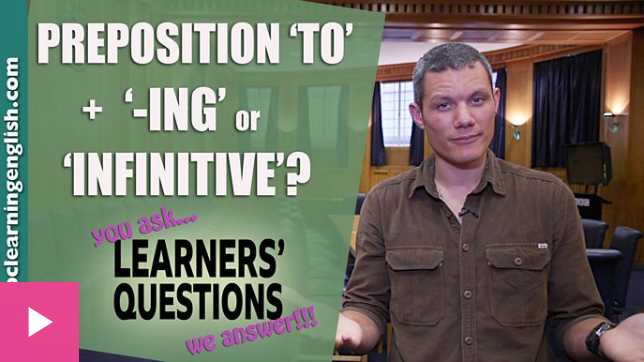This week’s question
After the preposition ‘to’, do we use +ing or infinitive verb? – Paola from Italy
Answer this
Complete the sentence: “I prefer _____ (eat) crisps to ____ (eat) chocolate.”
Language points
As a general rule: verb / noun / adjective + preposition + -ing verb
- Please sit down without speaking.
- I’m interested in learning to speak English.
Specifically using ‘to’ as a preposition:
Look forward to + -ing you (often used at the end of a letter)
- I look forward to hearing from you. Yours faithfully, Dan.
Admit to doing something wrong: admit + -ing. Admit means ‘tell the truth about doing something wrong.
- I admit to being the best English teacher I can be! Sorry! (Dan’s being ironic)
Object to doing something: object to + ing. Object means dislike, disapprove or dislike of something.
- I object to people throwing litter in the streets. Stop it at once!
Be used to doing something: used to + -ing. If you are ‘used to doing’ something, it means it is not new, unusual or strange to you.
- I’m used to having a cup of tea before leaving for work.
Preference: prefer -ing to -ing. You prefer doing X to doing Y, you compare two things – maybe your general likes and interests.
- I prefer cycling to running.
- I prefer teaching English to learning it.
Get round to doing something means do something after wanting to do it for a long time: get round to -ing verb
- I’ve finally got round to making this video for Paola from Italy.
Note: When ‘to’ is not a preposition
It’s usually followed by an infinitive. This happens after certain verbs such as want, need and would like (this is about verb patterns).
- I would like to go. I want to go. I need to go.
And it happens after an adjective and we use ‘to’+ infinitive verb.
- I’m happy to see you.
The answer
“I prefer eating crisps to eating chocolate.”
